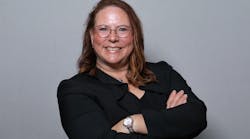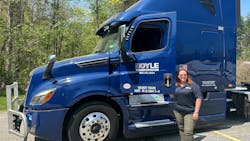Laura Duryea grew up on a farm in southern Pennsylvania. Growing up, she loved music and went to college for music performance at Carnegie Mellon University. When she graduated, however, she knew she wasn’t going to have a career in music.
When Duryea was in her early 20s, she had no money, and she was sleeping on a friend’s couch when she saw a TV commercial for CDL certification through the Pittsburgh Diesel Institute (PDI), which has since closed.
Luckily for Duryea, she was familiar with heavy equipment, growing up on a farm and all, and from her days driving the college shuttle at Carnegie Mellon. She got in touch with PDI, and after her first interview, they said, ‘So, you’re going to start tomorrow.’"
“I said, ‘OK,’” Duryea replied with a laugh.
Following five weeks of training, she obtained her CDL and applied for a driving job at Schneider (No. 7 on the FleetOwner 500: Top for-hire fleets). After completing a training program in Green Bay, Wisconsin, Duryea went back to Pennsylvania, where she met her husband, and they eventually started driving as a team.
The couple hit a roadblock one day when they were parked on the side of the road and got hit by someone who had fallen asleep behind the wheel.
“We got banged up pretty good and were in the hospital for a few days in Texas,” Duryea said. “Schneider flew us back to Carlisle [Pennsylvania] and put us on light duty.”
Despite being on light duty, she and her husband were still injured and needed time to heal before taking on too much more physical labor. Duryea’s mother-in-law had a campground, where they worked for a while before Duryea’s husband went back to driving flatbed. The couple then returned to Schneider on a dedicated account and bought an organic farm while working full-time.
See also: Women underscore ongoing harassment, driver training problems in trucking
Over the years, Duryea juggled driving, running the farm, and then volunteering with her husband at their local fire department. She ended up taking on another role at United Natural Foods Inc. (UNFI), working a job that involved hand carting and loading her own truck. Then a supervisor position became available. Duryea applied, but the company passed on her because they said she wasn’t there long enough to be a supervisor.
The person hired for the supervisor position was another driver, who had been with UNFI for 20 years; however, he went back to driving because he wasn’t great at managing people. Duryea applied for the position again and the second time around, the company hired her as a driver trainer supervisor.
At UNFI, Duryea developed training programs for driver trainers and started doing ride-alongs.
“I started developing a new driver training program before ELDT [entry-level driver training] was something Congress even thought about,” Duryea said. “We were starting to hire drivers that were coming out of school with no experience, and we wanted to make sure that they had training for inner-city driving and things like very tight backing situations to make sure they were prepared.”
Ultimately, things didn’t work out with UNFI, and Duryea took another driving job at Schneider, where she worked for 18 years in total from start to finish. That’s when Duryea and her husband found Massachusetts-based Boyle Transportation. She and her husband teamed with Boyle for two years, when the company’s driver recruiter retired. Again, Duryea jumped on the opportunity.
Today, Duryea is Boyle’s manager of recruiting and retention. And she has been successful in that position because she understands drivers.
“We know that drivers leave companies for equipment, pay, and when you screw with home time,” she explained. “Most drivers will do anything that you want them to do. They are super smart, they love their jobs, and they want to do a good job, but they want to be treated like professionals.”
Duryea said her goal at Boyle is to “build a fleet that is super psyched to be doing what we do.” That’s an easy sell considering Boyle delivers freight to the U.S. Department of Defense and has a large percentage of veterans and women hauling that freight.
“I want to create a place for people to not only feel proud about what they are delivering and what they are doing but also build an environment where it’s a community,” Duryea said. “Because of our pace of operations, drivers are able to develop friendships because they are spending a lot of time together.”
Boyle also is developing a chat channel that drivers can access on their company cell phones any time they have questions and need an immediate answer.
The course of Duryea’s career has led her to various roles, including sitting on a few Women In Trucking Association boards. Duryea also is one of 15 members on FMCSA’s Women of Trucking Advisory Board (WOTAB). During WOTAB’s first meeting earlier this year, the group discussed ways to prevent harassment and how the industry can create a better environment for women.
See also: FMCSA appoints Women of Trucking Advisory Board inaugural members
“When I entered the industry in the 1990s, cat-calling was still happening,” Duryea said. “Now, men approach women differently in the industry, but it’s still something that happens.”
“You can’t change behavior if it’s an accepted behavior,” she emphasized. “We need to educate allies within the industry that it’s not acceptable.”
At the end of the day, Duryea said she believes this is a great time for women and the next generation of younger drivers to join the industry because they have so many more opportunities today than they had in the past.





